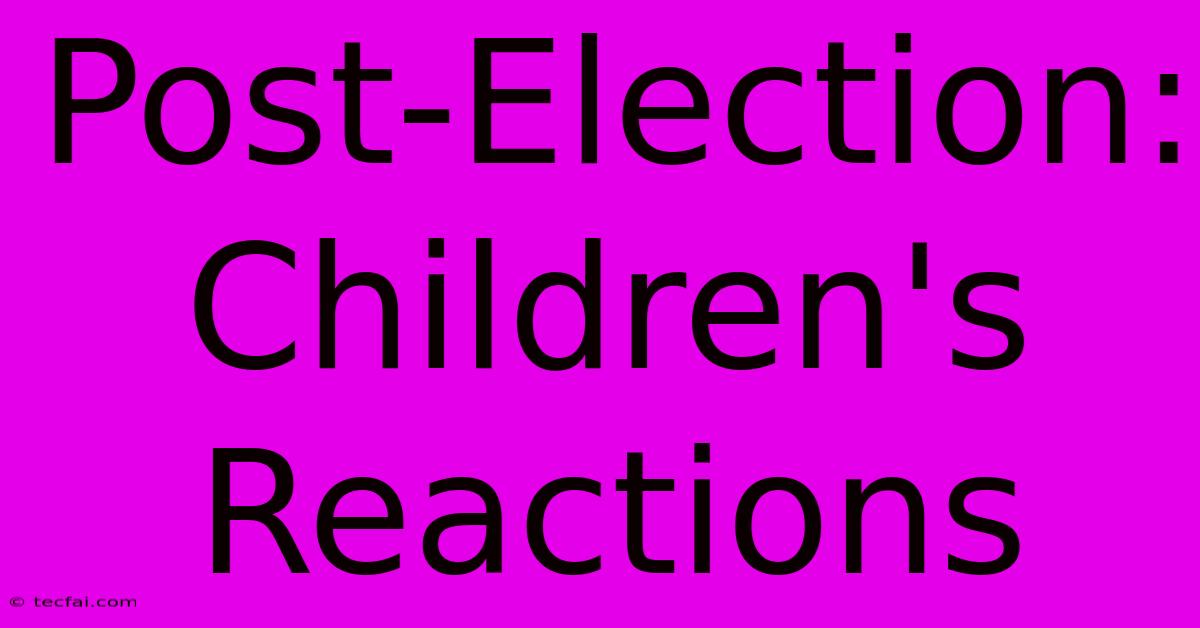Post-Election: Children's Reactions

Discover more detailed and exciting information on our website. Click the link below to start your adventure: Visit Best Website tecfai.com. Don't miss out!
Table of Contents
Post-Election: Navigating Children's Reactions
The aftermath of any election can be a whirlwind of emotions for adults. But how do we help children process the often-intense feelings surrounding a post-election period? Understanding their reactions and providing appropriate support is crucial for their emotional well-being. This post will explore common children's reactions to elections, offer coping strategies, and explain how to foster healthy discussions about civic engagement.
Understanding Children's Perspectives
Children absorb information from their environment, including the anxieties and conversations of adults. Their understanding of elections depends heavily on their age and developmental stage.
Age-Specific Reactions:
- Preschoolers (ages 3-5): May sense tension but lack the cognitive ability to grasp the complexities of the election. They might exhibit clinginess, changes in sleep patterns, or increased irritability.
- Elementary Schoolers (ages 6-12): Begin to understand the concept of voting and different viewpoints. They may ask questions about winners and losers, potentially expressing worry about what the outcome means for them or their families.
- Teenagers (ages 13-18): Possess a more nuanced understanding of political issues and may experience stronger emotional responses, reflecting their developing sense of identity and social awareness. They might feel disappointment, frustration, or even anger depending on the election results.
Common Reactions and How to Respond
Children might display a variety of reactions, including:
- Anxiety and Fear: Reassure them that they are safe and loved. Explain that while there may be changes, many things will remain the same.
- Sadness and Disappointment: Validate their feelings. Let them know it's okay to feel sad or upset. Avoid dismissing their emotions.
- Confusion and Questions: Answer their questions honestly and age-appropriately. Keep explanations simple and focus on facts rather than opinions.
- Anger and Frustration: Help them understand that it’s okay to feel angry but important to express those feelings constructively. Encourage them to find healthy outlets for their emotions, such as talking, drawing, or playing.
Creating a Safe Space for Discussion
Open communication is vital. Create a welcoming environment where children feel comfortable expressing their thoughts and feelings without judgment.
Tips for Healthy Conversations:
- Limit exposure to excessive news coverage: Constant exposure to news can heighten anxiety. Choose age-appropriate sources and limit screen time.
- Explain the electoral process: Use simple language to explain voting, candidates, and the overall process.
- Focus on facts, not opinions: Present information objectively, separating facts from personal opinions or biases.
- Encourage empathy and understanding: Help children understand different perspectives and the importance of respecting others' opinions, even when they disagree.
- Model healthy civic engagement: Show children how to participate in their communities constructively and respectfully.
Promoting Resilience and Civic Engagement
The post-election period offers an opportunity to teach children about resilience, democracy, and civic engagement.
Fostering Positive Actions:
- Volunteer as a family: Engage in community service to demonstrate the importance of contributing to society.
- Discuss current events: Engage in age-appropriate conversations about current events, encouraging critical thinking and informed opinions.
- Encourage participation in peaceful protests: If appropriate, and under supervision, allow teens to engage in peaceful protests or demonstrations.
By understanding children's reactions, providing emotional support, and fostering open communication, parents and educators can help young people navigate the post-election period and develop into responsible, engaged citizens. Remember, creating a safe and supportive environment is key to helping children process their emotions and understand the importance of democracy.

Thank you for visiting our website wich cover about Post-Election: Children's Reactions. We hope the information provided has been useful to you. Feel free to contact us if you have any questions or need further assistance. See you next time and dont miss to bookmark.
Featured Posts
-
Indiana Football Big Ten Title Shot
Dec 01, 2024
-
Uefa Futsal Sporting Cp Resultate
Dec 01, 2024
-
Bric Bloc Faces 100 Us Tariffs
Dec 01, 2024
-
Stratford Mayor On Press Closure Threat
Dec 01, 2024
-
La Liga Barcelona Las Palmas Live
Dec 01, 2024
